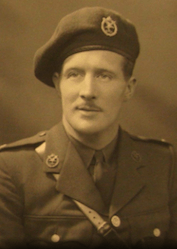Colin Leo Bliss facts for kids
Quick facts for kids
Colin Leo Bliss
|
|
|---|---|
 |
|
| Nickname(s) | "Charles" |
| Born | 27 April 1907 Sandy, Bedfordshire, England |
| Died | 10 July 1944 (aged 37) Le Mesnil, France |
| Buried | |
| Allegiance | |
| Service/ |
|
| Rank | Major |
| Service number | 253486 |
| Commands held | A Company, 12th Parachute Battalion |
| Battles/wars | Airborne D-Day Landings, World War II |
Colin Leo Bliss (born April 27, 1907 – died July 10, 1944) was a brave British soldier. He was a Major and a true pioneer in parachuting. People in the army knew him as Charles Bliss.
His dangerous early work helped design the parachutes used in the D-Day Landings. He would jump from low-flying planes with heavy gear. This helped make parachutes safer for others.
Before D-Day, King George VI visited the 6th Airborne Division. He asked who was behind the amazing parachute training. The General told him it was Bliss. The King then met Bliss and thanked him for his important work.
A writer named Leonard Mosley wrote about Bliss after he died. Mosley said Bliss was one of the bravest men who landed in France on D-Day. He called him "the greatest paratrooper of them all." Mosley himself parachuted into France with Bliss's group, even carrying his typewriter!
Contents
Early Life and Military Service
Growing Up in England
Colin Leo Bliss was born in Sandy, Bedfordshire, England. His birthday was April 27, 1907. He was the fifth son of John Wilfred and Dora Amy Louise Bliss.
He went to Bedford Modern School from 1919 to 1922. While there, he really enjoyed playing rugby.
Joining the Army
After school, Bliss worked in the Merchant Service. This allowed him to travel to many different places. Later, he joined the Bedfordshire and Hertfordshire Regiment.
When World War II began, he decided to volunteer for airborne service. He was one of the very first people to sign up for this dangerous role. He joined the 1st Parachute Battalion. He became a Sergeant Major in 'S Company'. In January 1942, he took an advanced parachute training course.
A Parachuting Pioneer
Designing Safer Parachutes
Bliss became a commissioned officer on December 5, 1942. He then joined the 12th Parachute Battalion. His early work was very risky. He jumped from planes at low heights with heavy equipment. This helped engineers design better parachutes. These designs were later used for the huge Airborne D-Day Landings.
Meeting the King
Just before D-Day, King George VI visited the 6th Airborne Division. He wanted to know who was responsible for the clever parachute training. The General told him it was Bliss. The King then met Bliss and congratulated him on his important contributions.
D-Day and Final Mission
Landing in France
Bliss was made a Captain before the Normandy Landings in June 1944. He had a special job for the D-Day mission. He carried Leonard Mosley’s typewriter ribbon, paper, and a camera. These were important for Mosley, who was also parachuting in to report on the war.
On the morning of June 6, 1944, Bliss landed in France. For two days, he was thought to be missing. But he had made it to Caen and started his work.
Leading His Company
Bliss's battalion successfully captured Ranville. They then helped attack German forces at St Honorine. On June 18, 1944, Bliss was put in charge of a special company.
On July 3, 1944, he took command of A Company. A few days later, on July 7, his company faced heavy enemy fire. Bliss bravely fired a Bren gun as he moved towards the enemy. He was wounded during this action.
A Hero's End
Colin Leo Bliss died from his wounds on July 10, 1944. He was buried at Ranville War Cemetery in Normandy, France.
Bliss was married to Anne May Moore on March 28, 1932. He had two sons. His obituary described him as incredibly brave. He once called his life as a paratroop leader "another glorious adventure." In his last letters home, he even described his part in the Normandy campaign as "great fun."
 | Jessica Watkins |
 | Robert Henry Lawrence Jr. |
 | Mae Jemison |
 | Sian Proctor |
 | Guion Bluford |

